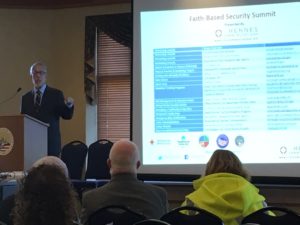Religious institutions cannot rely on God to protect their congregations from armed attacks, say religious leaders. That’s why more than 200 leaders of religious organizations and public safety officials from throughout Greater Cleveland attended yesterday’s Emergency Planning Workshop for Faith-Based Leaders and Executives at the Community Center in Middleburg Heights.

Bruce Hennes of Hennes Communications discusses Crisis Communications Planning at the Faith-Based Security Summit on November 20, 2017
Churches have a responsibility to protect their congregations, said Pastor Herman Matherson of Akron’s non-denominational House of the Lord. God works through people and it is people that must take proactive steps to protect themselves, he said. Paul Gewirtz of Young Israel in Beachwood agreed and said his organization is “very protective” of the safety of its members.
More than fifteen speakers from public safety, emergency management, and public health agencies, as well as faith-based institutions stressed the importance of having plans and being prepared. Many effective practices like assigning trained volunteers to monitor parking areas and building entrances can be implemented at little or no financial cost. If funds are available, physical security enhancements like improved lighting, placement of landscaping, installation of barriers and the use of video surveillance systems can be effective as well. The key, though, is to identify an institution’s vulnerabilities, carefully assess the risks, and develop realistic plans and procedures to reduce those risks.
Religious institutions are vulnerable because they bring large numbers of people together at regularly scheduled times and to maintain a welcoming atmosphere they rarely restrict entrance. But while the frequency of mass shootings in America continues to rise, there is no evidence that shootings at religious facilities are rising disproportionately. While comprehensive data about attacks against religious institutions is limited, research indicates that churches and other faith-based institutions are rarely targeted because of their beliefs. Most shootings that have occurred in churches have been the result of domestic situations. The recent attack at the First Baptist Church in Sutherland, Texas, which killed 26 worshipers, apparently stemmed from a domestic dispute. Church shootings remain extremely rare, but that is scant comfort to religious leaders who feel a responsibility to ensure the safety of their members.
The Workshop provided an overview of all aspects of security planning for faith-based institutions. FBI Special Agent John Breen discussed the threats of domestic and international terrorism and the need for institutions to conduct a realistic security assessment while Cleveland Police Commander Harold Pretel provided specific suggestions for reducing the vulnerability of religious facilities.
The first step, said Pretel, is for organizations to understand their vulnerabilities. Then, he continued, organizations can create tailored security plans to deter, detect, and disrupt violent attacks. Plans should provide for multiple layers of security including active monitoring of parking lots and pedestrian routes and use of security barriers and surveillance equipment.
Pastor Matherson and Gewirtz explained in detail the security practices at their organizations. Matherson’s House of the Lord, which normally attracts more than 1,000 worshipers to its Sunday services, utilizes a multi-layered security process conducted by a 37-member security team comprised of uniformed police officers, lay volunteers, and members of the church leadership. The church coordinates their plans and collaborates closely with Akron Police, Fire, Emergency Medical and Public Health agencies.
Gewirtz’s Young Israel, with a much smaller congregation, relies on highly trained volunteers to monitor parking areas and access to the building by carefully assessing anyone who seems suspicious. A uniformed police officer is available to protect the volunteer, but the responsibility for determining if a person is to be denied entrance rests with the volunteer.
Other speakers discussed hate crimes, ways to manage risks, Ohio’s open carry policies regarding firearms, licensing and hiring of private security guards, and methods for supporting persons with mental health issues.
Dr. Nancy Grant, CEO of Business Survive and Thrive, explained the basic steps to create a Continuity of Operations Plan (COOP), which can enable organizations to quickly resume operations following a disaster or emergency that forces them out of their building or prevents key personnel from filling their roles. The key is to integrate COOP processes into everyday operations and develop a COOP mindset, she said.
Bruce Hennes, Managing Partner of Hennes Communications – one of the co-sponsors of the Workshop – discussed the importance of having an all-hazards crisis communications plan in place before an emergency in order to provide accurate information and preserve the organization’s reputation.
In addition to Hennes Communications, the Workshop was co-sponsored by the City of Cleveland, Cuyahoga County, the City of Middleburg Heights, and the Red Cross.
For further information on church shootings, click on the following link:
http://www.cnn.com/2017/11/06/us/church-shootings-truth/index.html
November 21, 2017